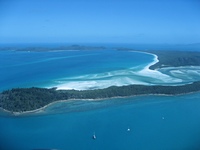
Fish swim in the ocean off Cabo San Lucas, Mexico. FLICKR/breezy421
A new study coordinated by SEI shows climate change alone could reduce the economic value of key ocean services by up to 2 trillion USD a year by 2100, and urges world leaders to make the oceans a priority in global sustainability goals.
The study, Valuing the Ocean, is the work of an international, multi-disciplinary team of experts, including SEI researchers. The full report is slated to be published as a peer-reviewed book later this year; a preliminary Executive Summary is being released to inform preparations for the Rio+20 Earth Summit in June.
A key part of the study is a groundbreaking analysis on ocean economics, designed to quantify the costs of ocean degradation, which are often invisible in the cost-benefit analyses that guide policy. The analysis calculates the cost over the next 50 and 100 years respectively in terms of five categories of lost ocean value (fisheries, tourism, sea-level rise, storms, and the ocean carbon sink) under high- and low-emissions scenarios.
By 2100, the annual cost of the damages from ‘business as usual’ emissions, projected to lead to an average temperature rise of 4°C, is estimated to be 1.98 trillion USD, equivalent to 0.37 per cent of future global GDP. A rapid emission reduction pathway that limited temperatures increases to 2.2°C would ‘save’ (i.e. avoid) almost 1.4 trillion USD of those damages.

Acapulco beach / Flickr- Akseabird
“These figures are just part of the story, but they provide an indication of the price of the avoidable portion of future environmental damage on the ocean – in effect the distance between our hopes and our fears,” says Frank Ackerman, director of the Climate Economics Group at SEI-US. “The cost of inaction increases greatly with time, a factor which must be fully recognised in climate change accounting.”
While climate change is an enormous threat, it is not the only one. A key point of Valuing the Ocean is that the convergence of multiple stressors – acidification, ocean warming, hypoxia, sea-level rise, pollution, and overuse of marine resources – could lead to damages far greater than just from individual threats.
The study does not put a monetary value on the total projected damages, many of which involve “priceless” losses such as the eradication of species, but it argues that given how much we do know about the potential costs, world leaders should take a precautionary approach and take strong action to protect oceans, even in the absence of complete economic data.
“We must develop an integrated view of how our actions impact the ocean, and threaten the vital services it provides, from food to tourism to storm protection,” says Kevin Noone, Director of the Swedish Secretariat for Environmental Earth System Sciences at the Royal Swedish Academy of Sciences, and co-editor of the report.
“The global ocean is a major contributor to national economies, and a key player in the earth’s unfolding story of global environmental change, yet is chronically neglected in existing economic and climate change strategies at national and global levels,” Noone adds. “We want to bridge these gaps and give a holistic view of the value of the ocean.”
The review presents the latest evidence of the way in which parts of the ocean are being affected by multiple stressors – for example ocean acidification, ocean warming and hypoxia – which means that the projected damage, and its costs, is much greater than with single impacts.

Great Barrier Reef. Flickr Noam Lovinsky/NOAML
“We no longer have the luxury of tackling only one issue at a time,” says co-author Julie Hall, of the New Zealand National Institute of Water and Atmospheric Research. “We urgently need to devise a management system that works across scales from local to global, and allows us to optimise our use of marine resources in a sustainable way given simultaneous, and often synergistic, threats.”
Valuing the Ocean urges policymakers to fully consider the threats to ocean services in broader economic and development plans, including by valuing the massive ‘blue carbon’ absorption potential of marine ecosystems. The authors also call for local measures, such as marine protected areas (MPAs), to boost the resilience of marine ecosystems to insure against the growing risk of extreme events like mass coral bleaching and more intense tropical storms.
But given the enormity of the climate threat in particular, the authors stress that the only way to avoid huge additional costs and disastrous consequences in the future is by dramatically cutting CO2 emissions.
The study was funded by the Okeanos Foundation, in partnership with the Foundation for Design & Sustainable Enterprise (FDSE).
On Monday, March 26, Kevin Noone and Julie Hall will chair a session during Planet Under Pressure, a major international conference focusing on solutions to the global sustainability challenge, at which they will present the key findings of the study.
Read the draft executive summary and chapter previews»
Read the press release (Deutsch, English, Español, Français, Italiano, Svenska)
Design and development by Soapbox.
